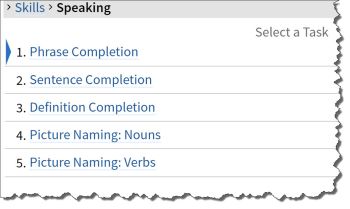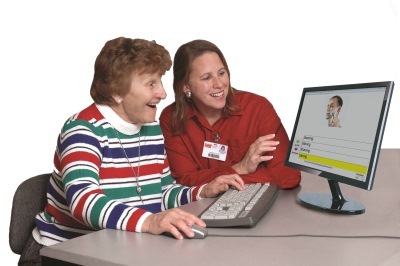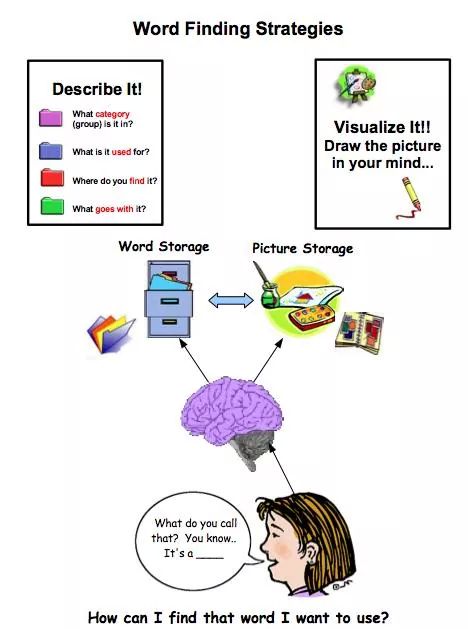5 Steps to to easier, less-frustrating word-finding
Practical word-retrieval (aphasia) suggestions from our speech therapist, based on research.
 One of the most common (and frustrating) deficits people come to us with
is word-finding difficulty. I call it tip of the tongue syndrome
because the words are all just beyond the mouth, on the tip of your
tongue. The most common diagnosis associated with this is Anomia or
Expressive Aphasia. Here are some tips for word-retrieval.
One of the most common (and frustrating) deficits people come to us with
is word-finding difficulty. I call it tip of the tongue syndrome
because the words are all just beyond the mouth, on the tip of your
tongue. The most common diagnosis associated with this is Anomia or
Expressive Aphasia. Here are some tips for word-retrieval.Try these treatment techniques:
-
Wait. Take a little break, and don’t try so hard to get exactly the right word – sometimes it will come to you in a minute(graphic)
-
Use your hands. Get your point across with a gesture (graphic)
-
Draw a picture. Get your point across with a sketch (graphic)
-
Write a word. Even if you only write a few letters, it might help your partner guess your meaning (graphic)
-
Say words which are related. Come up with a color, shape, use, or other words from the same category (graphic)
These suggestions all come from a treatment called “PACE,” which stands for “Promoting Aphasics’ Communication Effectiveness. “ This is a great treatment to practice at home, because you can use all those strategies when they count most – when you are really trying to say something important in a conversation. It doesn’t take any special materials, and the reward is effective communication!
Printable Therapy Reference
View the printable PDF version.
Hopefully, you're excited about the above tricks and tips. Here are a few ways to put them into immediate practice.
Practice with friends or family
When you just want to tell your spouse what you would like for lunch, you might try anything – pointing, gestures, drawing a picture. Make sure they give you enough time. I also highly recommend they review out the 3 Tips for better communication with Stroke (and Aphasia) survivors. That also includes a printable aphasia card you can show other people so they know how to help he survivor communicate.
Practice with speech therapy software
 You
practice with the
Morespeech.com web app using the
Speaking and
Writing skills. It works with every modern device (ipad, PC, etc.)
You
practice with the
Morespeech.com web app using the
Speaking and
Writing skills. It works with every modern device (ipad, PC, etc.)
It shows the patient a picture and they type or
speak the word for it.
If you have a Windows PC, you can can also practice your new word-retrieval technique with free trials of the speech therapy software I work on:
You can download free trials of the above. |
 |
Coming Next....
Games to practice your new language skill
The next issue of the Rehab Resources will cover games (which should be Activities of Daily Living for many families) in detail. I'll cover Charades, Scrabble, and Boggle and perhaps a few others. If you play games that you think help you, comment below and let me know.
Every day is an opportunity for recovery. Don't miss a single day.
- Surprising neuroscience discovery that makes recovery possible at any age.
- Why embracing failure leads to faster recovery.
- Unlock your survivor's communication needs in 4 steps.
- How to improve speech & language at the kitchen table.
Clay Nichols
Co-founder of
MoreSpeech and
Bungalow Software
for unlimited speech therapy at home and in the clinic.
 For
3 decades, Clay has helped patients, caregivers and speech pathologists
with speech & language software. He is not a speech-language
pathologist.
For
3 decades, Clay has helped patients, caregivers and speech pathologists
with speech & language software. He is not a speech-language
pathologist.
© 2025 Bungalow Software
